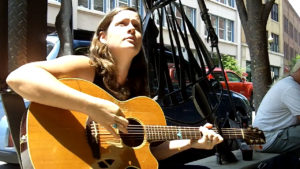
That’s why it was so great to run into Nikki. In a booming town increasingly filled with strangers, Nikki was a familiar face. Even better, she had brought her guitar.
Even at the time, it struck me as a little strange that Nikki was busking. She was no stranger to it, of course — she’d gotten her start as a busker, playing to crowds in Key West back in the ’90s, when she was still in her teens — but it seemed a little … small … for her.
She had been headlining shows at mid-sized listening rooms since the mid-2000s, and only a few years earlier, she’d absolutely dominated the Carolina Star competition (a localized take on American Idol, basically), gaining a significant amount of regional attention. Yet, here she was playing for dollar bills.
Looking at this now, from the perspective of 2016 where Nikki and her husband Jason Sharp play something like 200 live dates a year in a tour that has been going for roughly five straight years, it’s even more surprising. (In fact, that tour would start mere months after these recordings were filmed.) Nikki Talley didn’t need to busk. She could have a stage to herself and a room full of attentive fans any time she felt like it.
“Why are you busking today?” I asked her. “You need coffee money or something?”
“Because,” she said, giving that half-flirty smile I’d seen dozens of times over the years. “I like it. I miss it. I know that sounds so lame coming from a girl who has NikkiTalley.com and all that junk. But it’s true. It’s how I started.”
I’d met Nikki a few years after her time in Key West. I was a fledgling music journalist covering a fairly lame metal showcase at a now-defunct downtown venue called the Asheville Music Zone. Nikki’s band, the name of which escapes me, was one of the few highlights. We had a brief conversation that night, and even thought she was just this side of plastered, she remembered me well enough the next time we ran into each other.
She was clearly someone to watch, that much was obvious even circa 2001. I can’t tell you a single thing about any of the other acts on the stage that night, but I remembered Nikki Talley. There’s a power and a depth to her voice that cuts right through any song she plays.
Over the years, we crossed paths plenty of times. From a creative perspective at least, Asheville was a pretty small town in the ’90s and early 2000s. As a reporter for the local alt-weekly, I had plenty of opportunities to interview her, and for a while we lived in the same part of the Montford neighborhood. We become good acquaintances.
I watched her evolution from screamy metal-band frontwoman to Tori Amos-like piano songstress to folk-infused singer/songwriter to rising star in the Americana world, and yet every time we met she was the same smiling face framing a mouth that could all-too easily swear like a sailor. Hanging out with her outside and old-school haunt like Malaprop’s as she strummed out a few tunes, the city shutting down around us as the festival setup began, it felt for just a moment like the old Asheville I remembered.
After 20 minutes or so, I had to leave. As I was gathering my stuff to head back to the office, I asked her for one last song. “Well Oh Well” was the only tune I could think of from her 2002 solo album Brother, and so I requested it. It’s a dark song from an already dark album, and she was less than excited about the idea of going that far into her back catalog. The song was a decade back in her rear-view mirror.
“Are you sure? I haven’t even played that song since I got married,” she said. But, as a favor to me, she played it.
“That’s not a good song,” she said, with a half laugh. I disagreed. She shrugged, and waved as I headed down Haywood Street into the mess of pop-up tents and foot traffic. Her attention turned back to her audience. To the best of my recollection, that was the last time I saw her.
You must be logged in to post a comment.